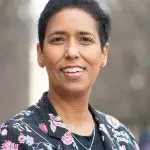 Dominique M. has always been passionate about learning the language of the country she lives in. She tells us what drew her into the Arabic program, the practical benefits of learning the language, and shares practical tips for other Arabic language learners.
Dominique M. has always been passionate about learning the language of the country she lives in. She tells us what drew her into the Arabic program, the practical benefits of learning the language, and shares practical tips for other Arabic language learners.
Hi, Dominique! Can you tell us a little about yourself?
I arrived in Abu Dhabi at the beginning of 2020 to work as a Training Manager and Art History Trainer at the Louvre Abu Dhabi.
Why did you decide to learn Arabic?
For me, it has always been important to learn the language of the country I live in. Plus I have a kind of madness for learning languages and getting to know the related cultures.
What could be a practical benefit of learning Arabic for you?
Being able to interact with locals in their native language is essential, but actually a little difficult in Abu Dhabi since everyone speaks English.
What level do you aspire to reach?
I haven’t got any specific goal. I would just like to be comfortable in oral conversation as to be able to talk to people on a daily basis.
What’s your best tip for people who want to start learning Arabic?
Actually, I think the start is the easiest moment. You get to learn a new alphabet and you have the impression of getting into calligraphy.
I would suggest reading as much as you can, anything in the street, from street names to shop names, from advertising to newspaper headlines, and also to listen to the radio regularly or to children’s videos to grab some words and relate words to images. I also have used the post-it technique at home: I put post-its with Arabic words connected to home appliances, rooms, actions in their environment. Thus, they are easier to remember.
What did you find challenging and how did you overcome it?
The most challenging part for me was and still is the conversation. As I started learning Arabic at the time Covid emerged, we were all more or less locked inside. I have missed interactions and occasions of practicing. I also have been forced to follow online classes all the way with less interaction with my teacher.
Are there any other languages on your bucket list?
Yes! Italian, Brazilian Portuguese, Farsi.
“…I would suggest reading as much as you can, anything in the street, from street names to shop names, from advertising to newspaper headlines, and also to listen to the radio regularly or to children’s videos to grab some words and relate words to images.”
Are you passionate about learning Arabic? Consider enrolling in an Arabic course with Eton Institute.
